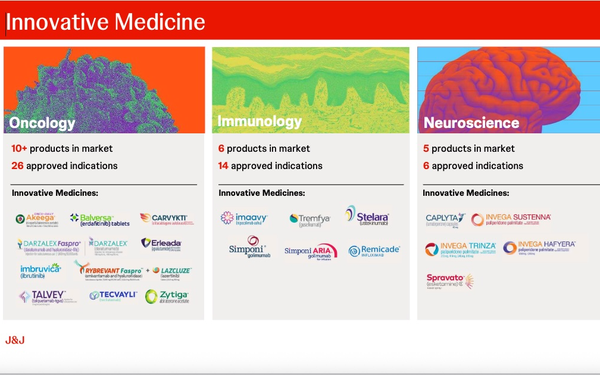
The morning after President Trump
told reporters that pharmaceutical tariffs could take effect as early as Aug.
1, Johnson & Johnson (J&J) kicked off big pharma’s earnings report season on Wednesday by cutting its projection of 2025 tariff costs in half -- from the $400 million
it had predicted in Aprilto $200 million.
This change was due to the U.S. and
China backing off of certain tariffs against each other, as well as delays in new U.S. duties on Mexico and Canada, CFO Joseph Wolk told The Wall Street
Journal.
advertisement
advertisement
The threatened pharma tariffs, meanwhile, would start off “low,” Trump said, and then become “very high” in a “year or
so.”
That would “actually be good news,” Wolk told Bloomberg, alluding to a slow tariff rollout giving pharma
companies time to get manufacturing facilities in the U.S. ready to produce tariff-free drugs. “You can’t put up a biopharmaceutical manufacturing facility overnight,” he said.
“I think we’re in a pretty good position.”
During Wednesday’s Q2 earnings call, J&J reported revenues of $23.7 billion, up 5.8% year-over-year,
while raising its 2025 guidance to between $93.2 billion and $93.6 billio Chairman-CEO Joaquin Duato noted that the company plans to invest $55 billion in the U.S. in the next four years, at which
point “our goal is to be able to manufacture in the U.S. all the medicines that are consumed in the U.S.”
CNBC’s Jim Cramer was quoted recently as saying he would “love it” if Trump would praise J&J, but it
“won’t happen” because “there’s someone {RFK, Jr.} in the Health and Human Services department that’s not crazy about big pharma.”
J&J execs, on
the other hand, had no qualms about doing the reverse by praising Trump and his policies during the earnings call.
“It's hard to know what is going to happen ultimately with
tariffs,” stated Duato,” but what we do know for sure is that the tax policies that just passed are already creating American jobs and driving innovation.”
“We are
pleased that the One Big Beautiful Bill Act provides certainty for our previously announced $55 billion commitment to invest here in the United States,” echoed Wolk. “This includes
provisions such as permanent expensing for domestic R&D spend, permanent bonus depreciation, and 100% expensing of qualified production property, including our newly planned facility in North
Carolina. We also welcome the improvements that were made to the international tax system.
“We share the Administration's goal that American patients should pay less by addressing the
real drivers of higher U. S. costs, including middlemen driving up prices and foreign markets not paying their fair share.”
Amid J&J’s Q2 sales, which exceeded expectations,
and its rosy 2025 outlook, prices of J&J and other big pharma companies’ shares rose during Wednesday morning trading.
An August implementation of pharma tariffs would have little
effect this year, Leerink Partners analyst David Risinger explained to Investor’s Business
Daily, because most companies have already stockpiled enough inventory to shield themselves from tariffs for six to 18 months.